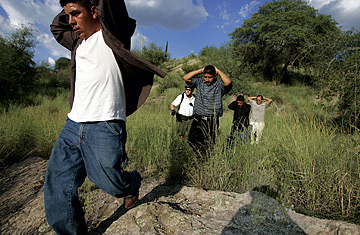
A group of apprehended illegal aliens walk to a U.S. Border Patrol vehicle in Nogales, Arizona.
So I admit to a rather jaded view of Congress' newest "breakthrough" on immigration reform. In some respects, the deal hammered out in the Senate, which looks set to pass the full chamber next week, is an improvement over past efforts. Currently, for example, the estimated ratio of illegals apprehended by the U.S. Border Patrol to the number that get across is about 1 to 3. The new plan, with hundreds of miles of new border fence and almost 20,000 new patrol agents, might close that gap.
But not appreciably — not as long as half of Mexico's and Central America's populations live in grinding poverty. What's more, because migrants would be forced to take even greater risks to evade the beefed-up border guard, the almost 500 of them who died in the desert last year (another record) might look like a small number in years to come. And U.S. employers — the same business lobby that rabid anti-immigration conservatives otherwise coddle — are sure to go almost any length, as they've always done, to skirt the new rules for verifying workers' legal status. Too much of our economy today depends on cheap fruit-picking, dishwashing and room-cleaning.
In essence, I fear the Senate's new bill promises to be this decade's contribution to a long line of immigration Band-Aids. Granted, its guest-worker program is the right idea, as long as it doesn't repeat the human rights abuses of the last century's bracero project. Letting 400,000 migrant construction workers, lawn-cutters and other laborers into the U.S. each year, legally and temporarily, is a solid way to turn the border's deadly chaos into a safer and more sensible flow — and let our border cops pursue genuine national security threats instead of Guatemalan nannies.
Yet some of the Senate's key guest-worker provisions are impractical at best. That includes the requirement that after two years working in the U.S., migrants must return to their home countries for a year before they can renew their status and come back to the States. No Mexican campesino I've ever met follows that kind of truncated migrant schedule. If he's not allowed to renew his two-year guest-worker stint immediately, he'll simply make another illegal crossing — and return to the same undocumented shadows we were trying to lure him out of. And the $5,000 "fines" illegals who are already here must pay to begin a legalization process? Let's be honest and call it what it is: an amnesty (though Senate Republicans have disguised it better than they did 21 years ago). But it may be too expensive an amnesty for many illegals to sign up for: it would have been more effective, psychologically, if the Senate had kept the "fine" closer to $2,000 — that is, what most migrants pay coyotes to smuggle them over the border.
The real mistake is assuming that immigration reform is domestic policy. It's foreign policy. We can blanket the border with barbed wire, but little will change on the illegal immigration front until we convince Mexico and Latin America to break open their monopolistic economies and close their shameless gaps between rich and poor. Mexican migrants alone send home as much as $25 billion a year in remittances. Those are now Mexico's largest revenue source — and a cynical social safety valve for its government. Some in the U.S. Congress have suggested slapping a tax on those wire transfers as a way to make Mexico's negligent elite more serious about economic development and job creation. Such measures would simply end up hurting poor families and villages; but the instinct to leverage Mexican officialdom seems right. Punishing illegal immigrants might make Lou Dobbs feel good. But getting Latin America's fat cats to take care of their own people for a change is the better solution.
